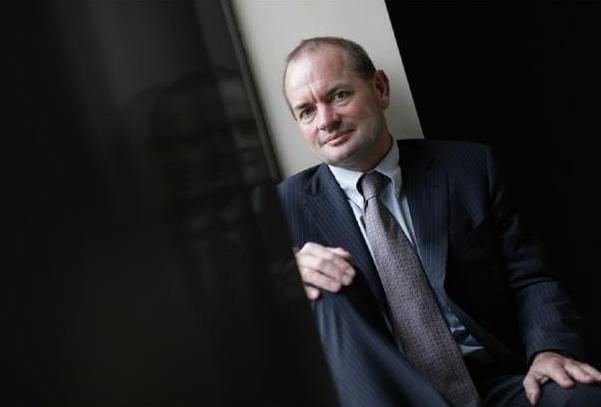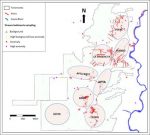
“Did you know you were getting the better end of that deal with Kinross?” I asked Lukas Lundin in his Vancouver office earlier this week.
“No No No,” he told me, “we thought it was worth more. You always love your own stuff.” Lukas laughed infectiously. Soon I was laughing along with him.
The Lundin organization’s $9.2 billion sale of Red Back Mining to Kinross Gold (Stock Profile – NYSE:KGC) in 2010 knighted the Sweden-born magnate into the Resource Hall Of Fame. For this was a deal that led to billions in writedowns for Kinross and the early retirement of Kinross CEO Tye Burt. Some say the sale was a sign of the times, perfectly encapsulating the excess that characterized the past decade’s resource bull market.
For the Lundins, it was a demonstration of impeccable timing. For their shareholders, incredible value was created — in all, they saw a 1041% return (total investment minus cash flows vs. final consideration).
*
The Lundins control exploration, development and production interests covering virtually every commodity around the world. For over 40 years, they’ve been one of the sharpest organizations in the sector, identifying exceptional resource projects, unlocking their value, and earning tens of billions for investors.
Family patriarch Adolf Lundin, who succumbed to leukemia in 2006, devoted the better part of his life to wildcatting, taking spectacular risks that eventually paid off.
In one of his first forays into the business in 1972, Adolf famously bet a Qatari Sheikh a million dollars it would rain the following day in the deserts of Qatar. The Sheikh accepted the bet and won. Shortly thereafter, Lundin was granted the licenses that led to the discovery of one the world’s largest gas/condensate fields.
With no guts, no glory as their family motto, the Lundins are just as comfortable in the jungles and deserts of Congo and Kurdistan as they are in boardrooms in Vancouver and Geneva. In 1992, with sons Lukas and Ian on board, the family invested $12 million in an Argentinian copper asset, Bajo de la Alumbrera. In 1995, it sold for $500 million. Today, the Lundin Organization controls mining and energy interests worth over $13 billion.
*
Success in the resource business takes three things, Lukas told me. “First — risk taking. Second — you have to be a giant optimist. Third — you have to be willing to go out there and do it. It’s easy to sit on a couch and talk about it, but then you have to actually fly to some crazy place and pick up the concessions and develop them.”
Some of Lundin’s views are not as conventional as you might expect of a corporate titan. For example, Lukas argues that demand for commodities is still strong, and the situation in Europe overblown. Most interesting is his forecast for America: “I think the US is on a complete tear. The next 10 years will bring the biggest economic boom you’ll see in your lifetime, because of free energy, a very flexible and productive workforce, and automation. You don’t need to send it to Japan and China anymore — you can do it at home.”
Investors will again see staggering returns in the resource business, Lundin predicted, but without a discovery, it doesn’t work. “Very few oil and gas and mining professionals — only a handful of people in the world — actually find deposits. It’s a mixture of art and geology.”
*
The Lundin Group is known for providing its technical people with the leeway necessary for trying out new ideas and making the important mistakes that can foster a mineral or energy discovery. Lundin Petroleum (TSX:LUP) recently tested a new concept in Norway on an area that had previously been drilled without success. Here they discovered an amazing 2 billion barrels of oil on the second go around, which Lukas believes are now worth over $12 billion. The market currently values Lundin Petroleum at $8 billion — not bad for an 11-year-old company.
Another Lundin venture, Africa Oil (TSXV:AOI), made a massive discovery in Kenya in 2012. The find resulted in yet another billion dollar score for investors.
But not all Lundin ventures are a resource investor’s fantasy. ShaMaran Petroleum (TSXV:SNM), the Kurdish oil and gas company, trades at just 31 cents. “That’s the one that’ll get you the biggest bang for your buck in the short term,” Lundin told us. “The Atrush Field we recently discovered looks really good. If we have success with the next well, and when we communicate our production plan, I think the company should be worth at least a buck a share. These are massive wells and the market just doesn’t understand yet.”
Lundin also has Blackpearl Resources (TSX:PXX) focused on heavy oil in Alberta. “The problem with the Canadian oil sector is the price differential due to lack of transportation,” he said. “In Eastern Canada, you sell oil for $90. In Alberta it’s $50. I don’t know why we’re not building a pipeline to the west coast. To rely on the US is crazy. With all the money we’ve invested in our oil sands, it couldn’t get much dumber.”
As for mining finance, Lundin sees things turning around in the fourth quarter of this year, but only for the best projects. “[Resource companies] have something like $50 billion of CapEx postponed around the world. Only the really good deposits will get financed for construction. What happens with majors is they buy everything at the peak and sell it at the bottom. It happens over and over.”
Over the next 18 months, Lundin Mining Corp. (Stock Profile – TSX:LUN) is hoping to take advantage of that pattern by buying the copper assets distressed majors are getting rid of. Lundin Mining was after the Pinto Valley asset sold to Capstone last week, but they’ll keep looking. “There aren’t that many buyers left. Capstone is probably out of the picture for a while, Hudbay too, and First Quantum has a lot on their plate, so it’s a very exciting time for us to look for assets.”
Lucara Diamond Corp (Stock Profile – TSX:LUC), the African miner, has done such a good job executing that the asset is performing better than Lukas expected. Unfortunately this isn’t the case for its stock price. “If you have a good asset and it’s doing well, it will reflect in the stock price over time. It has to,” Lukas told me. “We need another six months of production to show the market what we’re doing.”
On the Uranium front, Lundin’s Denison Mines (Stock Profile – TSX:DML) is focusing on the Athabasca Basin, having just acquired two smaller companies and spun off their US assets. The company is looking at additional acquisitions, and Lundin told me that he’s been very impressed with recent drill results coming out the Western side of the Basin. “I think it’s a very good time for us to grow the company in the Basin. We’re looking for more advanced assets, not drill plays.”
Lundin thinks it’s cheaper to buy development assets today than it is to explore for new deposits. Flat commodities prices mean fewer junior companies, but if there’s any movement in prices at all, more are bound to spring up. “It’s almost like driving through a desert. When it rains, it becomes green in a minute. The junior market is similar. When there’s positive news, suddenly, there are 50 new companies. It’s very receptive, there are a lot of people out there trying to make a buck, and we should encourage them.”
I asked Lukas for his take on the upcoming BC Election. “An NDP win is a certainty,” he said, “But that shouldn’t be too bad for Vancouver’s resource sector. How much worse can it get? It’s like kicking a dead horse!”
Should the resource business be privately financed, I wondered? Lukas believes there’s not enough private money. “Private equity can’t wrap their heads around the risks. Mining’s not like building a TV,” he said.
“One drill hole changes the game,” he continued, “It’s very hard to decide who gets to make it and who doesn’t. It’s a big gate, and yet very few can make it through. But you have to let them try, it’s healthy to have it public, as long as there are some rules, and not all the money goes to restaurant bills.” He went on, “It’s up to the investor to figure out what to do. To invest in the junior market if you’re not part of it, I wouldn’t recommend it. It’s very tough. There’s some good stuff out there but it’s hard, even in this market, to find good assets.”
Lundin also thinks Vancouver is losing a bit of its influence in the global natural resources business. “Have you been to Perth?” he asked. “It’s a town in the middle of nowhere with less than a million people, but internationally you always run into guys from Perth, they’re very entrepreneurial, and take a lot of risks.”
*
Of his peers in the business, Lundin complimented 36-year-old Timothy Young, an up and coming prospector. “Tim’s doing a good job. He’s smart because he’s not looking for a giant score, he exits, he’s very disciplined with what he does, and makes good money.”
“Robert Friedland has done a hell of a job. He works hard, has made mistakes. But he single-handedly carried all those land rushes, in Venezuela and Mongolia. It’s really incredible.”
Ross Beaty is another Lundin favorite. “Ross has all these crazy ideas about the world,” Lukas said affectionately, “and I disagree with basically all of them.” You could tell the two men are close.
I called on longtime Lundin lawyer and close business associate Brian Edgar, Chairman of Silver Bull Resources, Inc. (Stock Profile – TSX:SVB & AMEX:SVBL), to comment on what makes Lundin such a force. “Lukas doesn’t have a blackberry nor does he answer emails, his assistants handle that, but he has an amazing ability to grasp what’s important and ignore the minutiae. He is extremely loyal to his people and this loyalty is reciprocated. His powers of observation are as good as anybody I’ve ever met. Lukas can walk through a room in one minute and write down two pages of notes about what’s going on in that room. All of the skills you need for this business, he’s got in spades. His success has not come by accident or simply good luck.”
Veteran BMO Nesbitt Burns institutional equity salesman Colin Gibson, a friend and financier of the Lundins for two decades, added, “Lukas is very reliable, and he’s such a quick thinker. His incisiveness, curiosity and optimism are what sets him apart.”
Lundin doesn’t credit all his success to having guts. “You need luck, but you have to create a reaction to make luck. It also helps to be a great salesman, like Ross Beaty. The trick to being a great salesman is to never stop talking,” he laughed.
Lundin also had a piece of advice for promoters hit hard by the recent venture market meltdown. “If you have something of substance that’s really beaten up, don’t feel bad if your stock price was $5 and now its .50, and nothing has changed. You should go out and talk about it. This is our sector. Don’t hide.”
Lukas’s contagious enthusiasm shined bright throughout our conversation, as it has throughout his career. He’s got a lot to be excited about — his methodical risk-taking has paid off big. So here’s to Lukas’s optimism about the family’s current projects and the resource sector’s future as a whole. No guts, no glory.



 Follow us on Twitter
Follow us on Twitter Become our facebook fan
Become our facebook fan









Comments are closed.